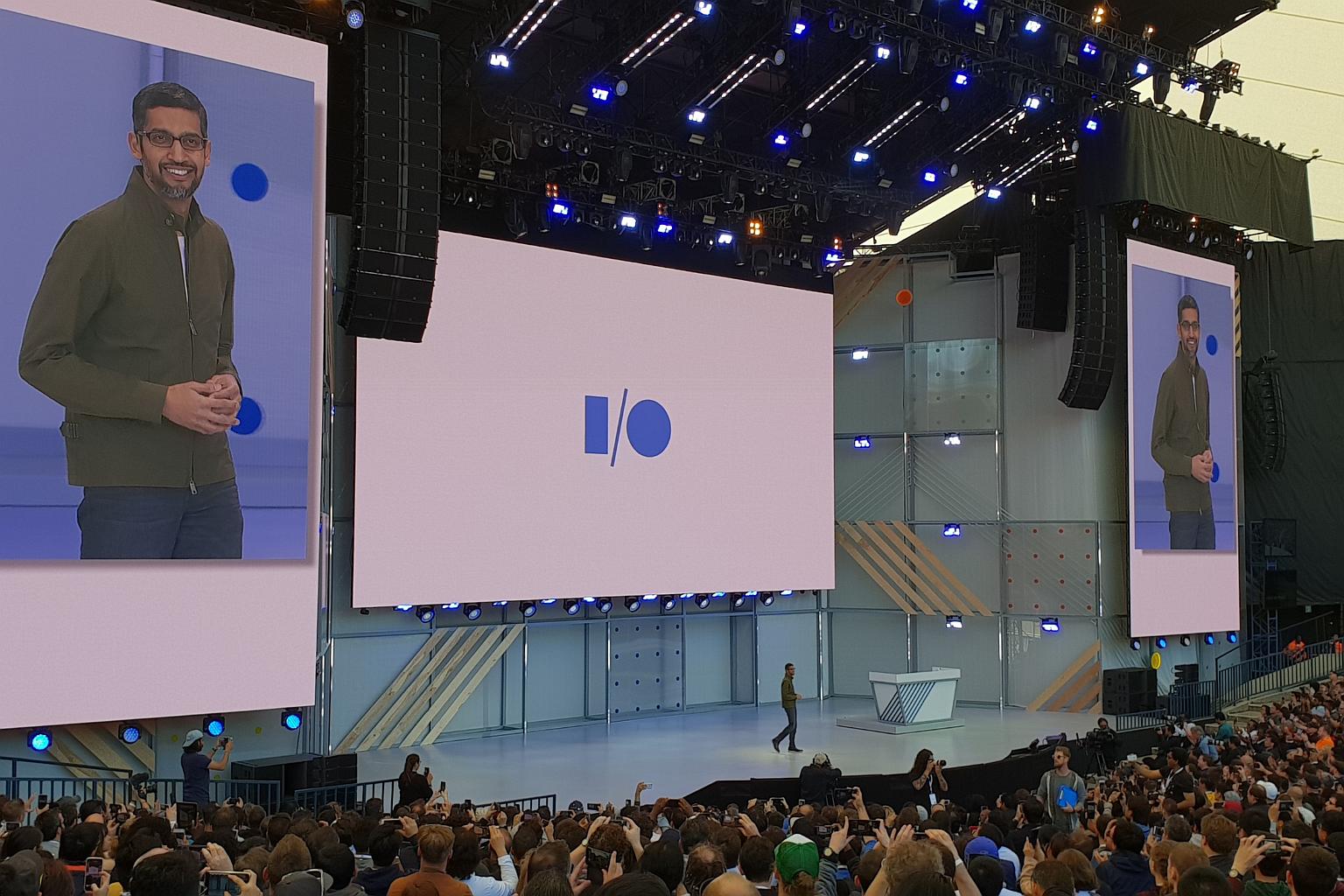Google unveils new AI-enabled functions, including Smart Compose for Gmail
Sign up now: Get ST's newsletters delivered to your inbox

Google chief executive Sundar Pichai speaking at the opening keynote of Google's annual developer conference.
ST PHOTO: VINCENT CHANG
MOUNTAIN VIEW (CALIFORNIA) - If you are stuck for words when writing an e-mail, help is at hand through a new Gmail feature that will understand the context of an e-mail and suggest phrases for users.
This Smart Compose feature was one of the latest Artificial Intelligence- (AI) enabled innovations unveiled by Google at the opening of its annual developer conference on Tuesday (May 8).
The tech giant announced new features powered by machine learning, where computers become smarter by learning on their own, which have been added to its services and apps, including Gmail, Photos and the Google Assistant.
For instance, Photos will let users share an image instantly with smart suggestions. Users can also make quick edits to photos, such as brightening them or introducing colour to black-and-white images.
Google also announced a new function to help users to avoid spending too much time on their phones - the latest version of its Android P mobile operating system (OS) will have a new Dashboard that shows how much time users have spent on their devices, including the time spent on apps and the number of notifications users have received.
New Google Assistant features
The bulk of the new AI-enabled features unveiled on Tuesday will go towards improving the Google Assistant, available now on 500 million devices, including smartphones, TVs, smart speakers and headphones.
Advances in AI have helped Google to reduce the time to create a new voice for the Google Assistant, as well as to make them sound more natural.
As a result, Google has added six new voices for the Google Assistant, all of which are now available for users to pick. Later this year, musician John Legend will be one of the voices added to the Google Assistant.
Users can also look forward soon to a more natural back-and-forth conversation with the Google Assistant. Users will no longer have to say "Hey Google" for each subsequent query after the initial "Hey Google".
The Google Assistant will also soon be able to understand and reply to multiple requests, such as turning on a smart home device and answering a question in the same request.
Outside of its Google Home smart speakers, the Google Assistant has been revamped to be more immersive and interactive on the phone.
This is achieved through a new interface that adds more visual elements, such as showing the controls for connected smart home devices on the phone. The Assistant will also give users a snapshot of their day, along with relevant suggestions.
Android P
As usual, Google's Android P mobile OS took centre stage at the developer conference. Version 9.0 of the popular OS has yet to get an official name, but the tech giant unveiled the beta version of Android P on Tuesday.
While Android 8.0 Oreo focused on under-the-hood changes that optimised the performance of the software, Android P will bring a host of visual changes that represent the first big overhaul of Android's general look and feel.
The first major change is the introduction of a new gesture-based navigation control that lets users control their devices without on-screen navigation buttons.
Other improvements include the use of AI to prioritise battery power for the apps and services used most by the user. Machine learning was also involved in creating an auto-brightness mode for the display, which learns your preferred brightness setting depending on the environment.
AI and digital well-being
Making the opening keynote presentation for the three-day event, Google chief executive Sundar Pichai reiterated the AI theme brought up last year, when he said the world has moved from being "mobile-first" to "AI-first".
Mr Pichai said healthcare will be one of the most important fields transformed by AI. For instance, AI could be used to predict a patient's risk of a heart attack or stroke, simply by examining medical images of the patient's eye.
He also acknowledged that technology, while being able to improve the lives of people, can create its own challenges.
For example, he added, users are struggling to find a balance in their lives because of the fear of missing out on news and other notifications from their phones.
Hence, Android P will include a new Dashboard feature that shows the amount of time users have spent on their devices.
The OS will include an App Timer feature to let users set time limits on apps. It will also have a new Do Not Disturb mode that, in addition to silencing phone calls and notifications, prevent notifications from appearing on the screen.
And to ensure that users go to bed on time, a new Wind Down feature will turn the screen to grey at a chosen time to help them remember that it is time to rest.
Google News revamp
Google is replacing two of its current news apps, Google Play Newsstand and the Google News & Weather app, with a new Google News app.
This new app uses AI to analyse news stories in real-time and organise them to help readers make sense of the stories. It will have a "For You" tab that offers five stories selected for users based on the top headlines, local news and topics relevant to users.
A "Full Coverage" feature brings up all relevant news articles to provide a complete look at a particular event or story. The content displayed by Full Coverage is not personalised for users, so everyone gets the same articles.
The app will be available on Android, iOS and the Web next week in 127 countries.


